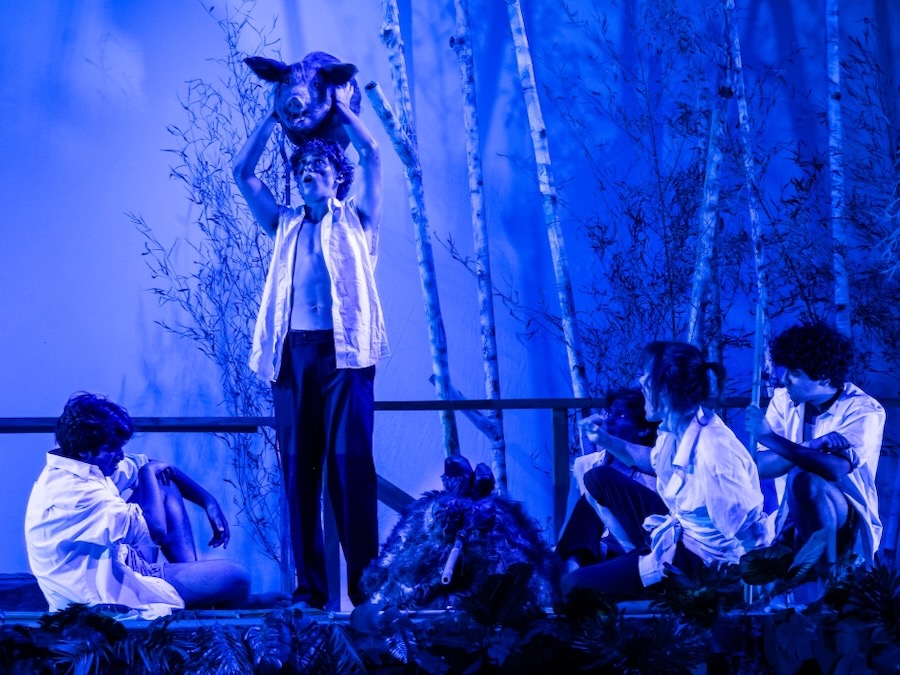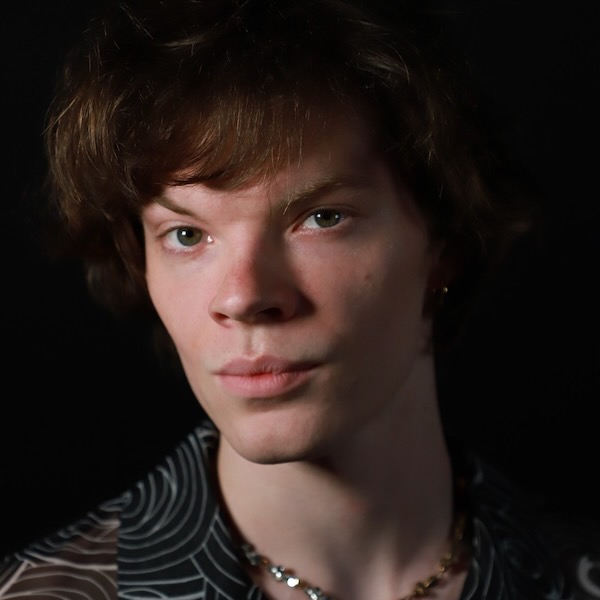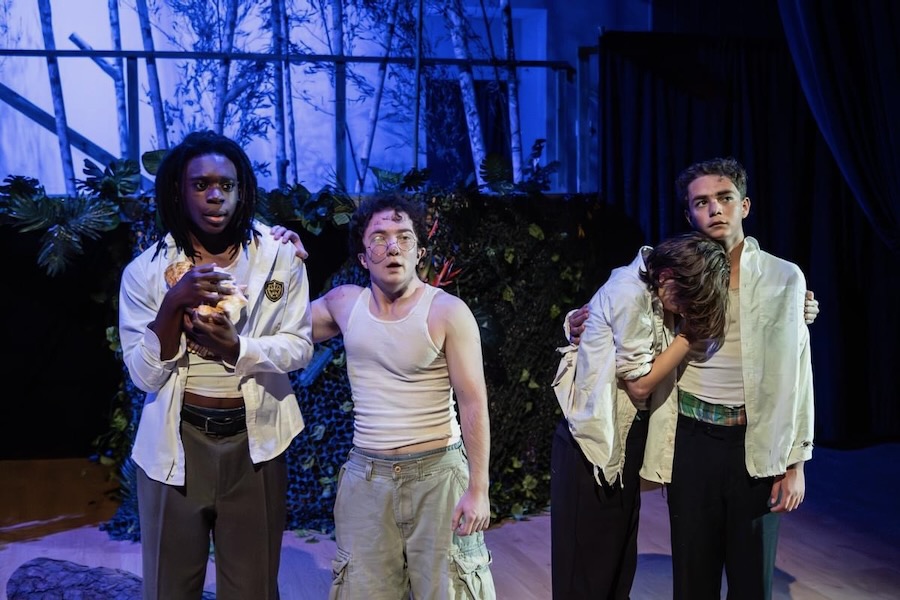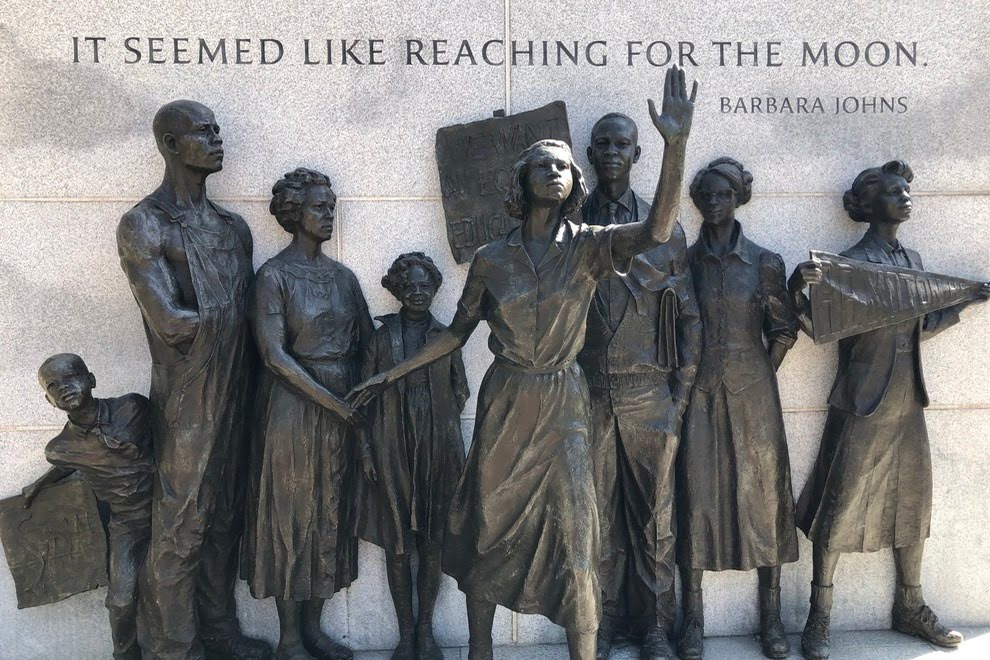Based on the award-winning allegorical novel, Lord of the Flies moves from the page to the stage at the Dominion Energy Center’s Gottwald Playhouse, courtesy of Richmond Shakespeare. This adaptation of William Golding’s classic (which I admit, I have not read) about the collapse of civilization among a group of stranded boys explores timeless themes of human nature, savagery, and moral order.
The story centers on a group of pre-adolescent boys, who have been marooned on a tropical island after their plane crashes during an ambiguous wartime evacuation. As circumstances test the boys, tension builds and the behavior desolves into savagery. They battle with inner demons and external fears, as the weakest among them become vulnerable. Driven by primitive bloodlust, the group’s descent into violence culminates in tragic consequences.
Directed by Jeffrey Cole, the production conveys the novel’s atmosphere and themes. Set design and wardrobe were particularly effective in grounding the audience in place and time. While the set remained almost entirely unchanged throughout the three acts, the characters’ wardrobe evolved to reflect the passage of time, with their clothing deteriorating or even disappearing, mirroring their psychological transfiguration from prep school kids to remote island survivors. Humor was employed deftly, albeit sparingly, to engage the audience without clouding key themes.
Most importantly, the acting was convincing and at times genuinely moving, especially given the relative inexperience of the cast, which made the emotional weight of the story all the more impactful.

Richmond Shakespeare’s Lord of the Flies Runs through Nov 10
The performances of the four lead actors were striking. Tavares Taylor, as Ralph, convincingly portrays the gradual unmooring of a character who maintained, at great cost, his commitment to a civilized, morally stable society. Taylor manifests the turmoil – at times veiled and at times starkly apparent – endured by all of the boys as they adapted to their harsh new reality. Sawyer Williams, in the role of Jack, epitomizes the role of the resident bully, projecting the zeal of an autocrat with just the right hint of insecurity beneath his bravado.
Liam Storm, playing Piggy, was warmly approachable for the audience, even serving as its proxy in his support for Ralph, a stance that became increasingly risky as the story progressed. Anthony Hernandez, as Simon, brought a mysterious and spiritual presence to the stage, highlighted by a gripping execution of his character’s psychological crescendo.

Abe Timm (they/them) delivered the show’s most compelling performance for me with their depiction of Roger, whose aura ranges from deferential to maniacal as they move along the characters arc. Timm’s performance occupied my thoughts on my drive home with reflections on how the necessary trait of human “adaptability” can be dangerous at the margins.
Maahin Kumar (Bill), Talon Bleacher (Maurice), and Ishaan Kulkarni (Henry) deliver in supporting roles as Jack’s minions. They emulate his zeal while not quite seeming sure of what’s happening around them.
Finally, the youngest cast members deserve mention and congratulations, as they played their essential parts with skill and aplomb and stirred in my wife and me a mix of parental ache and empathy. Victims of circumstance and malign intent, twins Sam (Aiden Denton) and Eric (Eli Davis) as well as Perceval (Hank Astoria) suffer and persist, simultaneously representing the innocence at risk and our capacity for survival.
Creative Staging Stands Out in Lord of the Flies
The direction and staging were clever and visually compelling, thanks largely to the 2-tiered set design, which enabled the audience to distinguish easily between the three key locations on the island. The artistically crafted, beach- and jungle-themed set served as a static foundation for the entire play, with lighting effectively marking transitions between scenes.
Initial costumes (by Lindsey Ladnier) reinforced that the boys came from different British boarding schools, largely unfamiliar with each other but cut from the same cloth. As the boys’ unwanted tropical excursion progressed, their costumes became increasingly ragged, reflecting the loss of civilization and their collective descent into savagery. Some characters ultimately donned war paint, further signifying their devolution.
The play’s conclusion felt a bit rushed and ambiguous. Having not watched the 1990 cinematic treatment of Lord of the Flies in at least thirty years, and never having read the book, I can’t say if the script for the final scene was the product of intentional conformance to the original story, even if at a cost; either way, I left longing for more resolution/exposition and less of an “okay, then” feeling.
Richmond Shakespeare’s Lord of the Flies leaves the audience with plenty to ponder about survival instincts, moral clarity, and the darkness that can emerge as power is pursued. The book, which is taught in many curriculums and also appears on many banned/challenged books lists, is recommended for thirteen and up.
I think kids about that age could handle Richmond Shakespeare’s production of Lord of the Flies (the youngest cast member is twelve) and the resultant conversations about our social system and power structure would be intense, to say the least.The production is two-and-a-half hour long, including two 10-minute intermissions.
Lord of the Flies, presented by Richmond Shakespeare, is showing at Libby S. Gottwald Playhouse Dominion Energy Center through November 10. For showtimes and tickets, visit richmondshakespeare.org.





